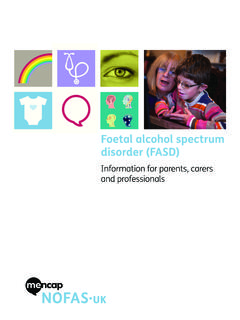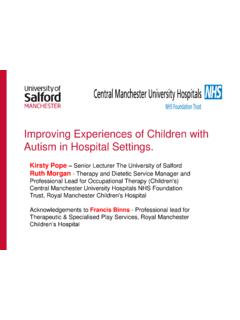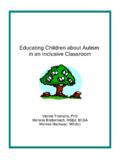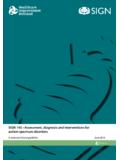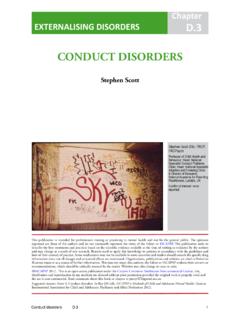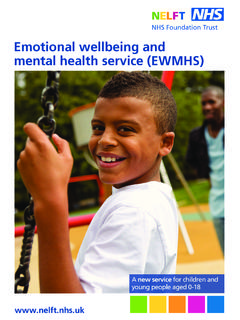Transcription of National Organisation on Fetal Alcohol Syndrome …
1 National Organisation on Fetal Alcohol Syndrome UK. 165 Beaufort Park London NW11 6DA. Facing the challenge and shaping the future for primary and secondary aged students with Foetal Alcohol spectrum disorders (FAS-eD Project). PROJECT REPORT. Carolyn Blackburn, Project Researcher, October 2010. E: Project Director: Professor Barry Carpenter, OBE. ACKNOWLEDGEMENTS. The children, families and schools involved in this project cannot be named for ethical considerations as children's identities must be protected. The project would not have been possible without their support, however, and the Researcher is grateful for their considerable input.
2 The University of Worcester have provided advice from their Research and Ethics Committee and access to trainee teachers for a Focus Group. The Department of Education at the University of Chester have evaluated the Teaching and Learning frameworks resulting from the project. The Frameworks have also been considered by Jackie Buscombe (Occupational Therapist), Suneeta King, (Speech and Language Therapist) and Alison Jeremy (Principal Speech and Language Therapist (Orofacial anomalies), Birmingham Children's Hospital). Jo Egerton, Project Research Associate has provided inter-rater reliability in relation to analysis of findings.
3 Dr. Tamara Brooks has provided advice about the use of engagement scales, as well as inter-rater reliability in recording engagement. The Project was guided by the Project Steering Group (see below), and the Researcher is grateful for individual support provided by each member at various points during the project: Project Steering Group: Mrs Carolyn Blackburn, Project Researcher Professor Barry Carpenter, OBE, Associate Director (SEN) and Director, Complex Learning Difficulties and Disabilities Project (Project Director), Specialist Schools and Academies Trust Professor Hilary Constable, Educational Consultant Ms Jo Egerton, Project Research Officer, Complex Learning Difficulties and Disabilities Project, Specialist Schools and Academies Trust (Project Research Associate).
4 Ms Susan Fleisher, Executive Director, NOFAS-UK and parent of a young woman with FAS. Dr Raja Mukherjee, Consultant Psychiatrist, Surrey and Borders Partnership NHS Foundation Trust. The Researcher is grateful to Robert Blackburn for providing practical and emotional support throughout the project, and to Scott and Timothy Blackburn for their technical support. Carolyn Blackburn 2. CONTENTS. Section Page Number Acknowledgements 2. Executive Summary 5. Introduction and Background to the Project 16. Methodology 18. Criteria for Inclusion of Students in the Project 19. Research ethics 23. Findings: 25.
5 The Lived Experience: Parent Perspectives 27. The Lived Experience: Student Perspectives 36. The School Experience: Teacher Perspectives 39. Researcher Observation: Engagement in Learning 50. Perspectives from Trainee Teachers 57. Impact of the Project: Participant Perspectives 57. Evaluation of the Frameworks: Participant Perspectives 61. Project Dissemination 65. Discussion of Findings 66. Carolyn Blackburn 3. Conclusion 71. Recommendations 73. References 77. Appendix A: Summary of Project Proposal 80. Appendix B: Case Study Profiles of Children with Teacher 84. Feedback on Effective Teaching and Learning Strategies Appendix C: Example Teaching and Learning Framework for 142.
6 Secondary Aged Students Appendix D: Dissemination Opportunities 183. Carolyn Blackburn 4. EXECUTIVE SUMMARY. This summary is intended to give a brief overview of this research project and Foetal Alcohol spectrum disorders (FASD). It will introduce the rationale for the project, the salient issues around Foetal Alcohol spectrum disorders , and give an overview of outcomes and recommendations. A. more detailed methodology can be found in the full report, and the project literature review is available online at What Are Foetal Alcohol spectrum disorders ? Foetal Alcohol spectrum disorders (FASD) operates as an educational umbrella term to represent the range of effects caused by prenatal Alcohol exposure.
7 These include learning difficulties and physical disabilities. FASD encompasses the following diagnostic terms: Foetal Alcohol Syndrome (FAS). Partial Foetal Alcohol Syndrome (pFAS). Alcohol -Related Neurodevelopmental Disorder (ARND). Alcohol -Related Birth Defects (ARBD). The complexity of the condition may be increased by any overlapping and co-existing conditions such as Attention Deficit Hyperactivity Disorder (ADHD), Autistic spectrum Disorder (ASD), Oppositional Defiance Disorder (ODD), Reactive Attachment Disorder (RAD), Sensory Integration Disorder (SID), Tourette's Syndrome , mental health issues (all of which may be present in one individual student).
8 Other compounding factors for children with FASD may include their personal family history ( multiple foster and/or adoptive placements), isolation and loneliness borne from being the only student in a school with this condition, lack of knowledge about the condition within the education, health and social care systems and society in general, barriers to accurate diagnosis and the hidden nature of students' difficulties. Secondary disabilities, such as poor mental health and insufficient engagement with the curriculum, can result from lack of appropriate diagnosis, sensitive support and interventions in the early years and primary age.
9 Carolyn Blackburn 5. Research Project Rationale Diagnosis is controversial, and under diagnosis is believed to be common, which suggests that there are more students in schools with FASD than are currently recorded. In addition, there is a paucity of knowledge in education, health and social services about FASD and how best to support students and families affected. There are currently no UK government guidelines or training available for the education workforce in connection with the support and education of students with FASD. I am surprised to have come across so many people who have no awareness of it (FASD), didn't seem to understand the impact it has on all aspects of children's development, but particularly on the way that they learn.
10 We have talked to Educational Psychologists and they've often said that we probably know more than them and sometimes that's a little bit worrying. (Parent interview). We know our child and we know bits about schools. We assumed that there would be people who knew about people in our child's situation and which school would be best, which would give us a clearer idea about it. It's a difficult decision and we need first hand experience to draw on. (Parent interview). There was a need, therefore, to identify the issues and challenges faced by students with FASD and those working with them in UK educational settings, as well as to record solutions developed by teachers in supporting these students and their families.
